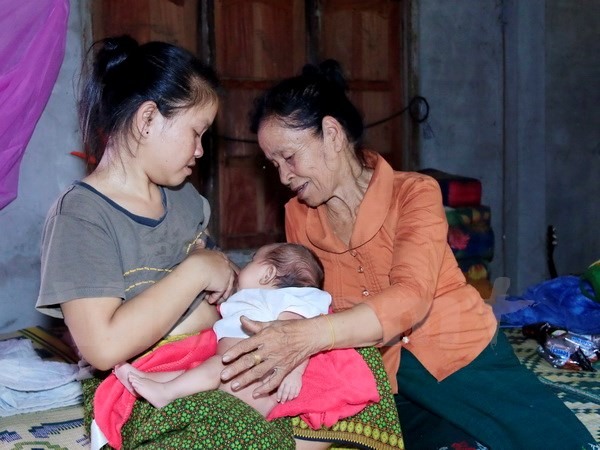 Society
Society

Kanchia, a shy 18-year-old woman, was breastfeeding her infant when a most extraordinary request was made of her.
 |
| Kanchia (right) watches her daughter breastfeed her baby . — Vietnamplus Photo Phạm Kiên |
HÀ NỘI — Kanchia, a shy 18-year-old woman, was breastfeeding her infant when a most extraordinary request was made of her.
To accede to the request, she would have to do something that was taboo in her community and country: give breast milk to an adult, a stranger she did not know.
It was the 1950s and a resistance war against French colonisers was being fought. Kanchia and her people were near the Huoi Dua spring, deep in the Trường Sơn forest in Laos. A unit of Vietnamese volunteer soldiers was stationed nearby.
As Kanchia was breastfeeding her child, a Vietnamese soldier came and asked her for some breast milk to help his seriously ill comrade, who had contracted malaria.
A warehouse of the Vietnamese soldiers’ unit, which contained food, had been destroyed by US bombs, which had also blocked roads that could be used to transport food.
The soldiers had no choice but to seek help from Kanchia’s village, especially to feed their sick comrades.
Seeing how weak and exhausted the Vietnamese soldier was, the young Lao mother decided to break a long-standing taboo and share her breast milk to save the soldier.
It was a brave decision. Under Lao tradition, a mother’s breast milk is considered blood that only be given to her children. “I was very shy at first and dared not to answer when I was asked for my breast milk,” she told the Vietnamplus online newspaper.
“However, when I saw the sick Vietnamese soldier, who was carried to our place, I decided to overcome my embarrassment and ignore our traditional custom,” she said.
Thanks to Kanchia, the Vietnamese soldier recovered and continued to fight alongside Lao soldiers against the colonisers. “I think Vietnamese people are like Lao people. I was afraid that the soldier could die and his parents, wife and children at home would lose him.
“I love the Vietnamese soldiers who had volunteered to help Lao people during the war. I had no idea about Việt Nam before but when the Vietnamese soldiers came to help my country, I had a strong admiration and love for them. It helped me overcome my shyness,” she said.
“Many people questioned my decision, but I did not care. The Vietnamese soldiers had voluntarily come to our country to fight for us and were willing to sacrifice their lives for us. They deserved our care.”
After leaving the Kanchia’s village in Lamam District, Xekong Province, in the south of Laos, the soldier who received Kanchia’s milk did not have a chance to return to see her.
Whether or not he was killed in the war, or whether some other circumstances prevented him from doing so is not known.
This story was recounted recently by Saikhong Sayasin, General Secretary of the Laos-Việt Nam Friendship Central Association. He said he’d heard many stories about the friendship between the two countries, but Kanchia’s was special.
“I was very moved to hear this story. This is the heart of a mother. Only a brave and loving mother can do this,” he said.
The Vietnamese volunteer soldiers returned to their country after Laos gained independence in 1975.
Kanchia went on to have a total of 12 children and now lives with her children and grandchildren in Lamam District. — VNS




